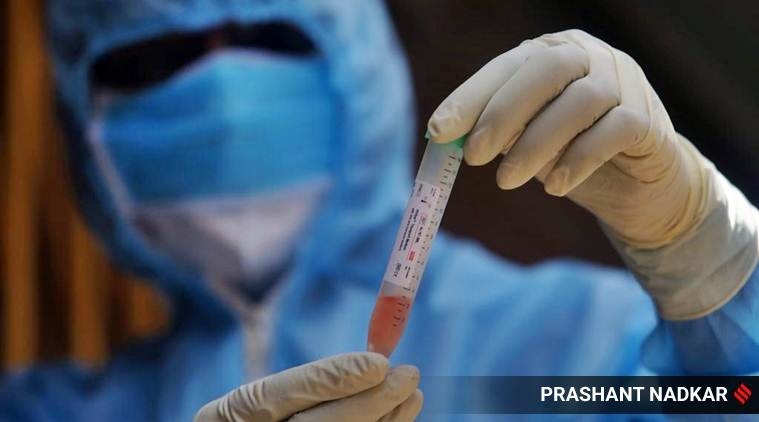
[ad_1]
 ICMR has not clarified its policy on rapid antibody tests since it blacklisted two Chinese firms over quality issues in April.
ICMR has not clarified its policy on rapid antibody tests since it blacklisted two Chinese firms over quality issues in April.
As the number of active Covid-19 cases crosses 2.75 lakh in the country, lopsided policies of the Indian Council of Medical Research (ICMR) have restricted options for rapid point-of-care (POC) tests, leaving manufacturers in a quandary.
While the rapid antigen test approved by ICMR on June 14 is restricted to symptomatic persons except those in containment zones and healthcare facilities, the rapid antibody test remains in the grey zone between “not banned” and “not recommended”. Rapid antibody and antigen tests use colour-coded strips and the results can be interpreted with the naked eye in 15-30 minutes.
Till June 19, the ICMR validated 56 rapid antibody test kits, 11 of which are Indian. But the test does not even figure in its June 23 advisory on ‘Strategies for Covid-19 testing’.
In fact, the Council has not clarified its policy on rapid antibody tests since it blacklisted two Chinese firms over quality issues in April. Instead, it transferred the Covid Kavach Elisa technology developed by National Institute of Virology, Pune, to seven pharma companies in May.
“Nobody feels confident to buy a kit without ICMR recommendation. While pushing antigen tests that are not sensitive enough, and Elisa tests that require a lab and time, they have put the rapid antibody test in cold storage,” said Rohan Kumar, Director, Diagnocure, a company in Solan that makes rapid antibody test kits.
As a result, many are waiting for validation for over a month. “This delay and the uncertainly will push MSMEs like us out of competition,” said an executive with Gujarat’s Nucleus Diagnosys LLP, another firm that produces these kits.
The Covid business | Test kits: Firms stuck between zero import duty and export ban
Those already validated have stopped or cut production. “There is demand, particularly from corporate houses who want their employees screened. We are selling some in states like Maharashtra and Telangana. With scale, the price will go under Rs 300 but the government policy is not clear,” said Anil Gugnani, owner of Delhi’s Sidak Life Care, which also produces rapid antibody test kits.
On June 10, the government allowed the export of rapid antibody tests. While a number of manufacturers are waiting for certification before exploring overseas markets, they say the export route cannot be a substitute for catering to the domestic market.
ICMR, however, claimed there was no necessity for a policy clarification. “There is no restriction at all. We blacklisted only two Chinese companies for quality. Others can sell and the stats are free to procure if they want,” said Dr Rajni Kant, Head, Research Management, Policy, Planning and Coordination, ICMR.
Explained | Coronavirus can be airborne indoors, WHO confirms. Now what?
But even big multinationals are in a limbo. South Korea’s SD Biosensor, for example, supplied rapid antibody kits to Chhattisgarh in April under Rs 400 a piece at a time when Chinese kits were going for Rs 600. Today, the company, say sources, has unsold stock of over 1.5 million. They have switched to antigen kits instead.
The only company validated by ICMR for antigen tests so far, the South Korean multi-national, say sources, has already supplied 3 million kits to areas as far as Ladakh. Delhi is one of the top states using the antigen kits with 15-20,000 tests per day.
Price-capped at Rs 450, the rapid antigen test shows results in 30 minutes. SD Biosensor is importing the kits from Korea till production begins at its Manesar plant by mid-July. On June 25, the ICMR invited other companies to validate their rapid antigen kits.
Read | No Covid vaccine appears possible before next year, House panel told
Yet, the simple point-of-care test is not available to a large section of the population that may benefit from it. “My parents live on their own. They want to avoid visiting a lab or calling for home collection to minimise contacts. With flu symptoms, they could use antigen kits at home to check if they need help. But they cannot buy it,” said a diagnostic lab executive in Delhi.
“This will take some time. Some states are already expanding the scope of using antigen kits. Hopefully, anyone willing to get tested will have access to the kit in the near future,” said Dr Rajni Kant of ICMR.
Meanwhile, Elisa test kits, which require a lab and results take 24 hours, are yet to catch on. Mumbai’s Transasia Bio-Medicals started supplying kits developed by its US arm Calbiotech in June. Only two — Mumbai’s Trivitron Healthcare and Delhi’s Karwa Enterprises — of the seven companies licensed by ICMR are ready with their products. Others, such as Haryana’s Avecon Healthcare and Delhi’s J Mitra & Co, said they would take another 2-3 weeks to hit the market.
Price-capped at Rs 205-plus-taxes by ICMR, the Elisa kit manufactured by Trivitron is available for Rs 215, said a company spokesperson.
On June 23, the Association of Indian Medical Device Industry (AIMED) wrote to the Health Ministry, protesting the purchase of Elisa kits in “large numbers” from a multi-national without calling for public tenders, even though seven Indian manufacturers were licensed by ICMR.
The Health Ministry did not respond to requests for comments.
📣 The Indian Express is now on Telegram. Click here to join our channel (@indianexpress) and stay updated with the latest headlines
For all the latest India News, download Indian Express App.
© The Indian Express (P) Ltd
[ad_2]
Source link